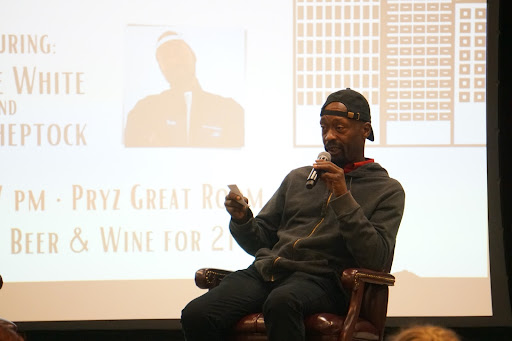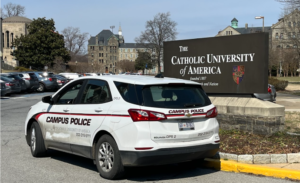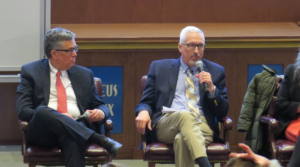Common Sense and Compassion Within Homelessness Awareness

Image Courtesy of Campus Ministry
by Trinity Ruiz
Two weeks ago, resident ministers hosted the third CUA on Tap event in honor of Hunger and Homelessness Awareness Week. Homelessness advocate Eric Sheptock and social worker Ruthie White came to Catholic University to speak about the common sense that plays a role in the homeless’ inability to obtain housing and the compassion that is pivotal to the equality of the majority and the homeless.
Sheptock was homeless for 15 years and has now devoted himself to the advocacy of equality for those who lack affordable housing. Alongside him, White, working for the National Housing Welfare, makes sure that social work offers flexibility and that the homeless are treated equitably.
After being physically abused by his birth parents as a child, Sheptock was adopted at the age of five and is now one of 37 natural and adopted Sheptok children. His adoptive mother wanted his name to be from the Bible, as were the names of all her kids; all of her girls are named Mary. Sheptock, choosing the name “Eric” for himself, was given the middle name of “Jonathan.”
Sheptock became homeless due to low minimum wage; working in a hospital in Florida for minimum wage, he was not able to sustain a rent payment and relocated back east. He went on to tell students that while working minimum wage, one must work 80 hours per week to afford a fair market rate. Sheptock strongly believes that, “Anyone who contributes to the life of D.C. deserves to live in D.C.,” and everyone who works in a city should be able to live in it.
Sheptock promotes the concept of implementary zoning, which means that for every new development 10% of that development has to be affordable. Through this, slowly but surely, a percentage of the homeless population will have the ability to access housing. This further ensures that the fair market rate will accommodate the homeless currently working for minimum wage.
In June of 2006 and during his advocacy, Sheptock came across two women who informed him that the District’smayor at the time, Anthony Williams, was enacting the closure of vacant government buildings. From Fall of 2002 to Fall of 2008 vacant buildings remained closed. When mayor Andrian Fenti took office in 2006, he promised that these buildings would re-open; this promise was not delivered. In addition, Sheptock devoted much of the event to speaking about the closing of the Franklin Shelter on K Street. While there is a large homeless population that resided on K Street, government officials made vast efforts to limit the homeless from inhabiting this area.
He goes on to tell his students that NoMa is notorious for “clean-up days”that are in effort to relocate the homeless. The homeless population is given two weeks’ notice to relocate for clean-up day; resorting to placing their tents just beyond the cut-off of the location from which they were asked to move. When the clean-up was completed, they placed their tents back to their original location. This only further emphasizes the prevalence of the public policy failure that White mentioned throughout the night.
Sheptock spoke about his friend, Patty Fugere, member of the Washington Legal Clinic for the Homeless, who has witnessed over the course of 30 years their denied efforts to place the homeless in hotels and “out of the elements.” Sheptock explained that one of the biggest mistakes people make is believing that because they are only capable of doing little, that action is not worth taking. With a 30 year outlook, it is worth considering the value of knowing you prevented one person from freezing rather than regretting not having contributed at all.
White claimed, “there is no one-size-fits-all philosophy” to helping the homeless because they all come from unique backgrounds. Sheptock’s journey through homelessness offered him a spiritual awakening through witnessing the trials the homeless face every day while being treated inequitably. As he had “more time to read the Bible and think deeply through scripture,” this enlightenment inspired Sheptock’s motive for advocacy of equality and helping the homeless through their individual journey. Due to the pertinent public policy failure, he concluded stating that “now is the time to intervene.”






